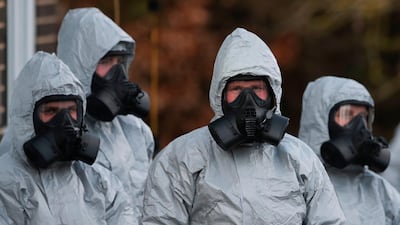Traces of the nerve agent used in the attack against a former Russian double agent and his daughter have been found at a restaurant they ate in before falling ill on Sunday, according to the BBC.
Sergei and Yulia Skripal were found on a bench in Salisbury two hours after eating at Zizzi, an Italian restaurant.
Zizzi remains closed by police as the investigation continues.
Earlier on Saturday, counter-terror police said they had identified 240 witnesses linked to the poisoning, but officials said it was still too early to say who was responsible for the attack.
Home Secretary Amber Rudd said officers had traced some 200 pieces of evidence in the investigation into the nerve agent attack that has left Colonel Skripal, 66, and his daughter, 33, critically ill in hospital.
"This investigation is focused on making sure that we keep people safe and also that we collect all the evidence so that when it comes to attribution we will be absolutely clear where it should be," she said after a meeting with investigators and senior officials.
The UK said it would seek assistance from Nato and employ the "full force" of its resources to respond to the poisoning.
The investigation had been focused on the home of Mr Skripal on Saturday amid growing belief that the former spy was poisoned at his home in the small city of Salisbury, 130km south-west of London.
Suspicion had fallen on the property because a police officer, Nick Bailey, fell ill after being among the first people to visit Mr Skripal’s house. He remains seriously ill in hospital but is well enough to sit up and talk with his family, said Ms Rudd.
The Russian state has been identified as the most likely suspect for the attack in an act of revenge against the former intelligence officer, who was convicted in 2006 of selling state secrets to MI6. He was released as part of a spy swap four years later.
Experts suggested that assassins could have broken into his house to spike drinks or food or that Ms Skripal unwittingly brought a tainted gift into the country while visiting from Russia.
The pair were only stricken while walking through the city on Sunday after leaving the house and going for a meal and drink together.
“There are lots of things that the United Kingdom can do,” Security Minister Ben Wallace told the BBC. “It is a powerful country with a powerful economy, powerful allies, powerful military and powerful other capabilities and we shall look at those all.”
____________
Read more:
British military brought in after spy nerve agent attack
British government urged to expel Russians over poisoning of former spy
____________
British media reports suggested that Prime Minister Theresa May could announce sanctions against Russia as early as Monday if experts conclude that Russia was behind the attack.
The government has urged caution before the source of the agent is known, but ministers have already raised the prospect of some form of boycott of the World Cup, due to be held in Russia later this year, and a longer-term build-up of troops in eastern Europe.
“We mustn't get ahead of ourselves but we must have a robust response and it's something that we'll be discussing with our Nato partners and with the forthcoming summit in Brussels in July,” said Tobias Ellwood, a Defence Minister.
“Some big questions arise as to how do you stand up to a clandestine and sinister attack deliberately done to play havoc in our society?”
Military chemical experts were continuing their work on Saturday in the city, including at the grave of Mr Skripal’s wife Liudmila, who was buried in 2012, and the memorial stone of his son Alexander, who was cremated last year.
Officers in protection suits were seen stuffing items in several yellow barrels, believed to be flowers left by Mr Skripal before he was stricken by the nerve agent.
Russia has denied any involvement in the attack that has left some 21 people needing medical treatment.
"We are accused not only of this, but of everything that, in the view of our Western partners, is wrong on this planet," said Foreign Minister Sergei Lavrov on Friday.
New details have emerged about the life of Mr Skripal, who was codenamed "Agent Forthwith" after he was first identified as a potential recruit in 1995 while he was stationed in Spain, according to The Times newspaper.
Even after he was jailed and finally returned to the UK, he continued to conduct monthly meetings with his former handler at a restaurant in the city, according to the newspaper, raising the prospect that he was still in active intelligence work.
He was known to have retained links with private security firms, including one co-founded by Christopher Steele, the former head of MI6’s Russia desk and who compiled the salacious dossier about Donald Trump.










